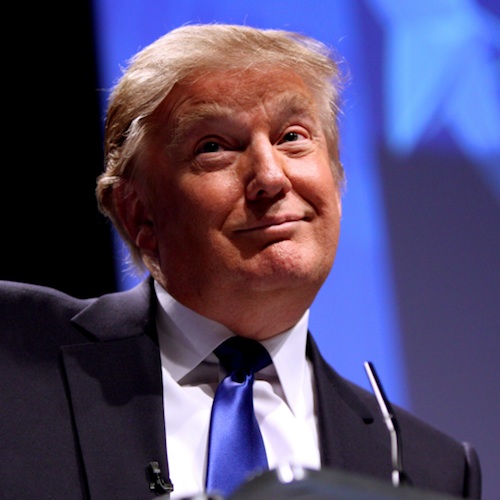Media enigma Donald Trump plays a roughneck on the trail. But his public demeanor belies a backstage dexterity and crafty touch when handling campaign matters, especially when it involves the media. So far we have learned that, in a match between Trump and the press, it is best to place your bets on the former.
That was on particular display this week, when he launched a preemptive strike that allowed him to take credit for intimidating a mainstream outlet and changing the rules for a forthcoming presidential debate.
On Wednesday, debate host CNBC joined the Republican National Committee and campaign representatives to discuss parameters for the Oct. 28 event in Boulder, Colo. But the conversation “turned heated,” Politico reports, when the advisors of multiple campaigns criticized CNBC’s proposed length (longer than two hours) and format (no opening or closing statements). “The entire purpose of the calls is to provide a two-way street of information and feedback,” Sean Spicer, an RNC spokesman, wrote in an email to Politico. “As was stated we are taking their feedback and will follow up.”
The follow-up call was just as contentious. Everyone was fired up, according to Politico, but Trump’s camp soon after joined that of Ben Carson in going one step further, issuing a public ultimatum in a letter to CNBC’s Washington bureau chief: “Neither Mr. Trump or Dr. Carson will participate in your debate if it is longer than 120 minutes including commercials and does not include opening and closing statements.”
In a statement Thursday, CNBC spokesman Brian Steel disputed that the criteria had been set before the series of phone calls: “We started a dialogue yesterday with all of the campaigns involved, and we will certainly take the candidates’ views on the format into consideration as we finalize the debate structure.”
Nevertheless, Trump upped the public pressure. As media outlets began picking up the threat—the letter itself has since been viewed more than 1 million times, according to Scribd—Trump took to Twitter to air his grievances in more Trumpian fashion. He followed up with similar criticism that night in an interview with Fox News.
The @GOP should not agree to the ridiculous debate terms that @CNBC is asking unless there is a major benefit to the party.
— Donald J. Trump (@realDonaldTrump) October 15, 2015
.@CNBC is pushing the @GOP around by asking for extra time (and no criteria) in order to sell more commercials.
— Donald J. Trump (@realDonaldTrump) October 15, 2015
Why is the @GOP being asked to do a debate that is so much longer than the just-aired and very boring #DemDebate?
— Donald J. Trump (@realDonaldTrump) October 15, 2015
The two Trump-centric GOP debates so far have broken audience records at both Fox and CNN, combining to draw nearly 50 million viewers. A presidential debate without the two highest-polling candidates, meanwhile, would be journalistic malfeasance. So it’s difficult to envision a scenario in which CNBC would hold an event that Trump and Carson would sit out. Regardless of whether the network had already finalized its preferred structure, it had little choice but to bow to the candidates’ demands—or at least appear to.
CNBC’s Steel declined to comment.
Trump understood his leverage. He foresaw how a conflict-crazed political media would cover his public challenge of CNBC. And he knew his target audience: “CNBC AGREES TO TWO-HOUR DEBATE: THIS IS WHY TRUMP IS WINNING,” a Breitbart News headline eventually blared. The crux of the issue—whether CNBC foisted debate criteria on candidates at the last minute—has become moot. Trump challenged the mainstream media, and the mainstream media backed down. It’s red meat for his supporters, an end in and of itself.
“We need a standard-bearer who is not only willing to stand up to the media,” Breitbart’s John Nolte writes, “but who also knows how to prevail against the media.”
David Uberti is a writer in New York. He was previously a media reporter for Gizmodo Media Group and a staff writer for CJR. Follow him on Twitter @DavidUberti.

